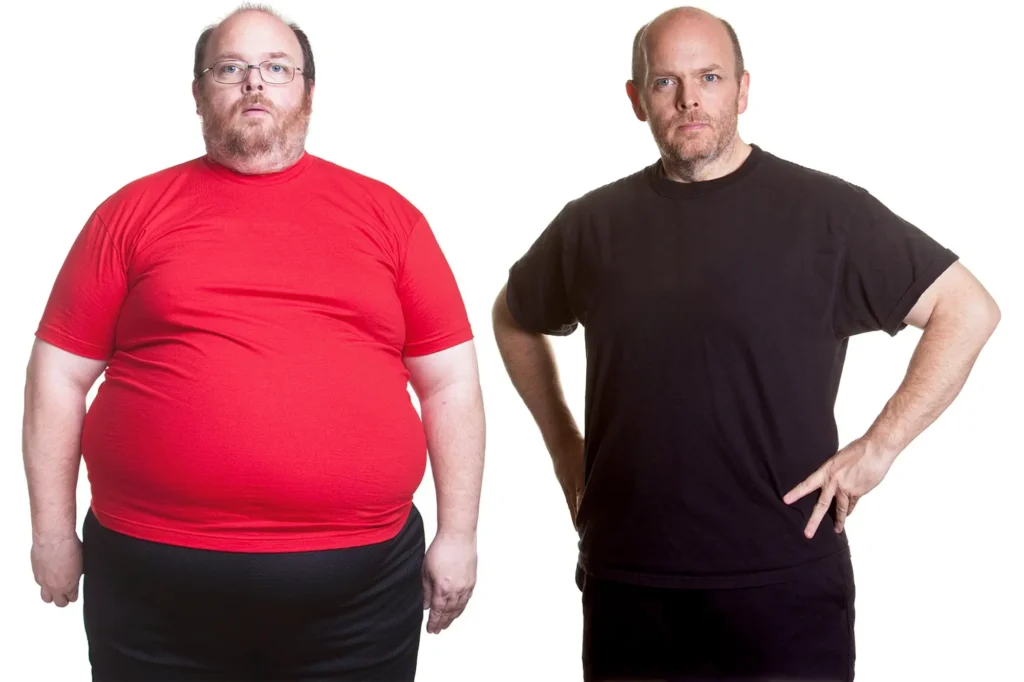
I’ve always believed that age is just a number, and that applies to our fitness and weight loss goals too. If you’re in your fabulous fifties or beyond and looking to shed some pounds, don’t worry, I’ve got you covered. In this article, I’ll be sharing some invaluable tips and strategies specifically tailored for those of us who are over 50. So whether you’re aiming to fit into your favorite pair of jeans or simply want to feel healthier and more energized, read on to discover the secrets to successful weight loss after 50. Trust me, it’s never too late to start on your journey towards a better, fitter you. Setting Realistic Goals

This image is property of scitechdaily.com.
Scientists Discover A Hidden Root Cause Of Stubborn Belly Fat, And It Will Surprise You…
Understanding the importance of realistic goals
When it comes to weight loss, setting realistic goals is crucial. It’s essential to have a clear understanding of what is attainable and sustainable for your body and lifestyle. Unrealistic goals can lead to frustration and disappointment, making it harder to stay motivated on your weight loss journey. By setting realistic goals, you set yourself up for success, both mentally and physically.
Identifying a target weight
Before embarking on a weight loss journey, it’s important to identify a target weight that is healthy for your body and age. This weight should be achievable and sustainable in the long term. Consult with a healthcare professional to determine a target weight that aligns with your individual needs and body composition. They can provide guidance based on your height, metabolism, and overall health.
Breaking long-term goals into smaller milestones
long-term weight loss goals can feel overwhelming, but breaking them down into smaller milestones can make them more manageable. Instead of focusing on the total amount of weight you want to lose, set smaller, achievable goals along the way. For example, aim to lose 1-2 pounds per week or engage in regular exercise for a certain number of days each week. Celebrating these smaller milestones will keep you motivated and encouraged throughout your weight loss journey.
Choosing the Right Diet
Considering individual nutritional needs
When choosing a diet, it’s important to consider your individual nutritional needs. Each person’s body is unique, and what works for one person may not work for another. Consider factors such as dietary restrictions, allergies, and preferences when selecting a diet plan. It’s essential to provide your body with the necessary nutrients while also creating a calorie deficit for weight loss.
Exploring different diet options
With so many diet options available, it’s essential to explore different approaches and find one that suits your lifestyle and preferences. Some popular diets include the Mediterranean diet, the DASH diet, and the ketogenic diet. Each diet has its own unique principles and guidelines, so take the time to research and understand how they align with your goals and nutritional needs.
Consulting a healthcare professional
Before starting any diet, it’s crucial to consult with a healthcare professional. They can assess your overall health and provide guidance on which diet may be most suitable for you. A healthcare professional can also monitor your progress and ensure that you’re meeting your nutritional needs while losing weight. Their expertise and guidance will help you make informed decisions about your diet.

This image is property of i0.wp.com.
The Secret For Healthy Weight Loss…Click Here…
Prioritizing whole foods and balanced meals
Regardless of the specific diet you choose, it’s essential to prioritize whole foods and balanced meals. Whole foods, such as fruits, vegetables, lean proteins, and whole grains, are rich in nutrients and provide your body with the essential fuel it needs. Aim to have a well-rounded plate with a variety of colors and textures. Balancing your meals will help you stay full and satisfied while providing the necessary nutrients for your body.
Creating a Calorie Deficit
Understanding calorie deficit for weight loss
A calorie deficit is the key to weight loss. It means consuming fewer calories than your body needs to maintain its current weight. When your body is in a calorie deficit, it taps into stored fat for energy, leading to weight loss. Understanding the concept of a calorie deficit will help you make informed decisions about your food choices and portion sizes.
Determining daily calorie intake needs
To create a calorie deficit, you need to determine your daily calorie intake needs. This can be calculated based on factors such as your age, weight, height, activity level, and weight loss goals. Online tools and calculators can provide an estimate of your daily calorie needs. However, it’s best to consult with a healthcare professional to get a more accurate assessment based on your individual needs.
Incorporating physical activity
Physical activity is an essential component of creating a calorie deficit and achieving weight loss. Engaging in regular exercise helps burn additional calories and boosts your metabolism. Find activities that you enjoy and incorporate them into your daily routine. This can include walking, jogging, swimming, cycling, or any other form of exercise that gets your heart rate up and makes you break a sweat.
Tracking calories consumed and burned
Tracking your calorie intake and expenditure is a helpful strategy to create a calorie deficit. Numerous apps and websites allow you to track your food intake, exercise, and overall calorie balance. By logging your meals and activities, you gain a better understanding of your calorie intake and how it aligns with your weight loss goals. This awareness allows you to make adjustments and stay accountable on your weight loss journey.
Incorporating Regular Exercise
Understanding the importance of exercise
Regular exercise is crucial for overall health and weight loss. It not only helps burn calories and build muscle but also improves cardiovascular health, bone density, and mental well-being. Engaging in physical activity boosts your metabolism and helps maintain muscle mass, which is essential for weight loss and overall body composition.

This image is property of Amazon.com.
Choosing suitable activities for older adults
As we age, our exercise needs may change. It’s important to choose activities that are suitable for older adults and take into consideration any physical limitations or health conditions. Low-impact exercises such as walking, swimming, and gentle yoga are excellent options for older adults. Consult with a healthcare professional or a personal trainer who specializes in senior fitness to create an exercise routine tailored to your needs.
Creating an exercise routine
To make exercise a regular part of your life, create an exercise routine that works for you. Schedule dedicated time for physical activity and make it a priority. Find activities that you enjoy and mix up your routine to keep it exciting and challenging. Aim for a combination of cardiovascular exercise, strength training, and flexibility exercises. Consistency is key, so find a routine that fits into your lifestyle and stick with it.
Combining cardiovascular exercise and strength training
To maximize weight loss and overall fitness, it’s essential to combine cardiovascular exercise with strength training. Cardiovascular exercises, such as running, biking, or dancing, help burn calories and improve cardiovascular health. Strength training exercises, using weights or resistance bands, help build muscle, boost metabolism, and increase overall strength. By combining both types of exercise, you create a well-rounded routine that supports your weight loss goals.
Building Muscle Mass
Recognizing the benefits of muscle mass
Building muscle mass is not only about aesthetics but also essential for overall health, especially when it comes to weight loss. Muscle is metabolically active tissue, meaning it burns more calories at rest compared to fat. By increasing your muscle mass, you raise your metabolism and create a more efficient calorie-burning machine. Additionally, building muscle improves strength, balance, and bone density, reducing the risk of injury and age-related conditions.
Incorporating strength training exercises
To build muscle mass, incorporate strength training exercises into your routine. These exercises can be done using free weights, machines, or resistance bands. Focus on targeting all major muscle groups, including the arms, legs, back, chest, and core. Start with lighter weights or resistance and gradually increase as your strength improves. A personal trainer or fitness professional can guide you in proper form and technique for optimal results.
Using resistance bands or weights
Resistance bands and weights are excellent tools for strength training, especially for beginners or those with limited space and equipment. Resistance bands provide varying levels of resistance, allowing you to challenge different muscle groups. Free weights, such as dumbbells or kettlebells, provide resistance through gravity, offering a wide range of exercises for building muscle. Choose the option that works best for you and consult with a fitness professional for guidance on proper use.

This image is property of hips.hearstapps.com.
Gradually increasing intensity and repetitions
To build muscle mass effectively, it’s important to progressively increase the intensity of your strength training exercises. As your muscles adapt and become stronger, gradually increase the weight or resistance used. Along with intensity, gradually increase the number of repetitions performed for each exercise. This progressive overload ensures that your muscles continue to be challenged, leading to increased muscle growth and strength over time.
Prioritizing Sleep and Stress Management
Understanding the impact of sleep and stress on weight
Sleep and stress have a significant impact on weight loss and overall well-being. Lack of sleep can disrupt hormones responsible for appetite regulation, leading to increased hunger and cravings. Chronic stress can also affect hormone levels, leading to weight gain, especially in the abdominal area. Prioritizing sleep and stress management is essential for maintaining a healthy weight and overall health.
Practicing good sleep hygiene
Good sleep hygiene involves implementing habits and routines that promote quality sleep. Establish a consistent sleep schedule by going to bed and waking up at the same time every day, even on weekends. Create a sleep-friendly environment by keeping your bedroom cool, dark, and quiet. Avoid stimulating activities, such as screens and vigorous exercise, before bedtime. Additionally, practicing relaxation techniques, such as deep breathing or meditation, can help calm the mind and prepare for a restful night’s sleep.
Exploring relaxation techniques
Managing stress is key to weight loss success. Explore different relaxation techniques to identify what works best for you. This can include activities such as yoga, meditation, deep breathing exercises, or engaging in hobbies that bring you joy. Taking time each day to relax and recharge helps reduce cortisol levels, the stress hormone associated with weight gain. Find activities that help you unwind and incorporate them into your daily routine.
Prioritizing self-care
Self-care is an essential component of maintaining overall health and well-being. Take time to prioritize yourself and engage in activities that bring you joy and relaxation. This can include activities such as taking a warm bath, reading a book, spending time in nature, or enjoying a hobby. Prioritizing self-care reduces stress levels and promotes a positive mindset, which are essential for long-term weight loss success.
Staying Hydrated
Understanding the role of hydration
Staying hydrated is crucial for overall health and supports weight loss efforts. Water plays a vital role in numerous bodily functions, including digestion, metabolism, and energy production. Adequate hydration helps regulate appetite, promotes proper digestion, and can boost metabolism. Making sure you drink enough water throughout the day is essential for maintaining optimal health and supporting weight loss goals.

This image is property of health.clevelandclinic.org.
Setting daily water intake goals
While there is no one-size-fits-all recommendation for daily water intake, setting a goal can help ensure you stay hydrated. The general guideline is to drink at least eight glasses (64 ounces) of water per day. However, individual needs may vary depending on factors such as activity level, climate, and overall health. Listen to your body’s thirst cues and adjust your water intake accordingly.
Incorporating fluids through food and beverages
Staying hydrated doesn’t just mean drinking plain water. Many foods, such as fruits and vegetables, have high water content and contribute to overall hydration. Additionally, beverages like herbal tea, unsweetened coffee, and infused water are great alternatives to plain water. Aim to incorporate a variety of hydrating foods and beverages into your diet to maintain proper hydration levels.
Avoiding excess sugary drinks
While it’s important to stay hydrated, it’s equally important to avoid excess sugary drinks. Beverages like soda, fruit juice, and sweetened coffee or tea are often high in calories and added sugars, which can hinder weight loss efforts. Instead, opt for unsweetened or lightly sweetened options, such as herbal tea or flavored water. Be mindful of the added sugars in your drinks and choose healthier alternatives whenever possible.
Making Sustainable Lifestyle Changes
Embracing a long-term approach
Weight loss is not a temporary endeavor; it requires a long-term commitment to sustainable lifestyle changes. Avoid quick fixes and fad diets that promise rapid weight loss but are not sustainable in the long run. Embrace a holistic approach that focuses on nourishing your body with nutritious foods, engaging in regular physical activity, and practicing self-care. By adopting healthy habits that become part of your daily life, you set yourself up for long-term success.
Fostering a positive mindset
A positive mindset is crucial for weight loss success. Believe in yourself and your ability to make lasting changes. Celebrate your achievements, no matter how small, and learn from any setbacks or challenges along the way. Replace negative self-talk with positive affirmations and surround yourself with supportive and encouraging individuals. Cultivating a positive mindset will help you overcome obstacles and stay committed to your weight loss goals.
Building healthy habits
Creating healthy habits is essential for long-term weight loss success. Focus on building habits that support your overall health and well-being. This can include meal prepping and planning, engaging in regular exercise, prioritizing sleep, and practicing stress management techniques. Consistency is key when building habits, so start small and gradually incorporate new practices into your routine. Over time, these habits will become second nature, contributing to a sustainable and healthy lifestyle.
Seeking support from friends, family, or a support group
Weight loss journeys can sometimes feel challenging, and having a support system can make a significant difference. Seek support from friends, family members, or join a support group where you can connect with individuals who share similar goals and experiences. Surrounding yourself with like-minded individuals provides accountability, motivation, and encouragement, making it easier to stay focused on your weight loss journey.
Avoiding Fad Diets and Quick Fixes
Understanding the dangers of fad diets
Fad diets often promise quick results, but they are not sustainable or healthy in the long term. Many fad diets restrict certain food groups, severely limit calorie intake, or rely on expensive supplements or meal replacements. These diets can lead to nutrient deficiencies, metabolic imbalances, and a negative relationship with food. It’s essential to avoid fad diets and instead focus on making lasting and healthy lifestyle changes.
Recognizing the importance of gradual progress
Weight loss is a gradual process, and it’s important to recognize and appreciate the progress you make along the way. Set realistic expectations and understand that healthy weight loss is typically 1-2 pounds per week. Avoid comparing your progress to others and stay focused on your own journey. Celebrate each milestone and remember that slow and steady progress is more sustainable and beneficial in the long run.
Avoiding drastic calorie restrictions
Drastically restricting calorie intake may lead to initial weight loss, but it is not sustainable or healthy in the long term. Severely reducing calorie intake can slow down your metabolism, lead to muscle loss, and result in nutrient deficiencies. It’s important to create a moderate calorie deficit that allows for adequate nutrition and energy levels. Consult with a healthcare professional or registered dietitian to determine an appropriate calorie intake for your weight loss goals.
Prioritizing overall health and well-being
Instead of solely focusing on weight loss, prioritize overall health and well-being. Shift your mindset from solely focusing on the number on the scale to nourishing your body with nutrient-dense foods, engaging in regular physical activity, and practicing self-care. Remember that being healthy extends far beyond weight loss. By prioritizing your overall health, you will naturally achieve sustainable weight loss and improved well-being.
Monitoring Progress and Adjusting
Setting up a weight tracking system
Tracking your progress is essential for staying on track with your weight loss goals. Set up a weight tracking system that works for you, whether it’s using a spreadsheet, a mobile app, or a journal. Weigh yourself regularly, preferably at the same time of day and under similar conditions. Track these measurements over time to identify trends and adjustments that may be necessary to achieve your desired results.
Recognizing non-scale victories
While the scale is a useful tool for tracking weight loss progress, it’s important to also acknowledge non-scale victories. Non-scale victories include things like increased energy levels, improved sleep, better fitting clothes, increased strength, or improved mood. These victories highlight the positive changes happening in your body and overall well-being. Celebrate these achievements throughout your weight loss journey.
Reassessing goals and strategies periodically
As you progress on your weight loss journey, it’s important to periodically reassess your goals and strategies. Factors such as changes in metabolism, lifestyle, or personal preferences may require adjustments to your approach. Revisit your goals and determine if they are still realistic and achievable. Assess the strategies you’re using and make changes as necessary. Don’t be afraid to seek professional guidance to help you navigate any challenges you may encounter.
Seeking professional guidance when needed
If you’re facing challenges or struggling to achieve your weight loss goals, don’t hesitate to seek professional guidance. A registered dietitian, personal trainer, or healthcare professional can provide individualized guidance and support. They can help you navigate any obstacles, answer your questions, and provide practical solutions to help you achieve your goals. Professional guidance can be invaluable in ensuring that you’re on the right track and making progress towards sustainable weight loss.
In conclusion, losing weight after 50 requires setting realistic goals, choosing the right diet, creating a calorie deficit, incorporating regular exercise, building muscle mass, prioritizing sleep and stress management, staying hydrated, making sustainable lifestyle changes, avoiding fad diets and quick fixes, and monitoring progress and adjusting. By following these tips and strategies for success, you can achieve your weight loss goals and improve your overall health and well-being. Remember to approach your weight loss journey with a positive mindset, embrace gradual progress, and seek support when needed. Stay committed, stay motivated, and be proud of the steps you take towards a healthier lifestyle.
The Most Potent, Fast-Acting Formula For Incinerating Stubborn Fat
